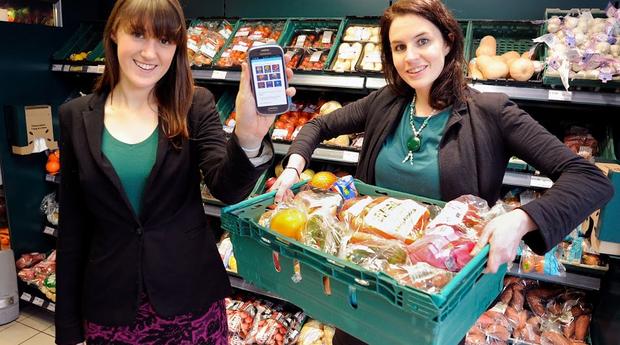Iseult is a One Young World Ambassador from Ireland and the co-founder and CEO of FoodCloud, a social enterprise created to tackle food poverty in Ireland.
More than 30% of food produced is wasted across the global food system. We actually use farmland the size of China, Mongolia and Kazakhstan combined to grow food that is never eaten. At the same time, one in eight people, that is 842 million people across the world, are hungry.
In Ireland we waste one million tonnes of food annually. Wasting food is a waste of money, a waste of natural resources and raises serious moral questions when you consider that one in ten people in Ireland are living in food poverty.
When I was in my third year of university there was only one small food bank in Ireland so I knew I had to do something. I helped to set up FoodCloud, a not-for-profit social enterprise that connects businesses with surplus food to local charities using an app and website. The other co-founder, Aoibheann and I bonded over a love of food and a hate of waste. Our mission was to create innovative uses for surplus food that empower people, bring communities together and create lasting positive social change.
[[[image-1-large]]]
We started by calling local farmers’ markets and charities and in June 2012 we facilitated FoodCloud’s first donation. It was great to see food that would otherwise have been wasted donated to a local charity. We wanted to do more, and as young social entrepreneurs we turned to technology. I think one of the benefits of being a young entrepreneur is that we can use technology to find a sustainable and scalable solution to a problem. As college students with no resources but a total commitment to the cause, we went about researching what was happening internationally and what was possible in Ireland. Through that research we identified the app as a low-cost local solution to match food surplus with food scarcity within communities.
Once I graduated we were fortunate be accepted into two accelerators in Dublin, Trinity College’s Launchbox and the National Digital Research Centre’s Launchpad. They both introduced us to the start-up business scene in Dublin, an amazing community that we are lucky to be a part of. There are so many people in Dublin and Ireland that are passionate about technology and entrepreneurship and are always happy to share their experience and lend advice.
Our big break came in October 2013 when the supermarket Tesco took a leap of faith and agreed to trial FoodCloud in a store in Dublin City Centre. We expanded the trial to 18 stores and then, on July 1st 2014, FoodCloud entered into a partnership with Tesco that would see surplus food from their 146 stores across the country donated to local charities.
So how does it work? Food businesses, that register with FoodCloud, can upload details of their surplus food and specify a time for collections. An automatic text message is then generated and sent out to the most appropriate local charity offering them the food. The charity simply texts back to accept the offer and collects the donation from their local store at the time included in the text.
Since our launch, we have redistributed 80 tonnes of food, the equivalent of 176,000 meals to a network of 130 charities in 12 counties across Ireland. That is around seven tonnes a week from 57 donating businesses and as we continue to grow the volume of food redistributed daily grows too.
We charge businesses an annual subscription fee and with no cost to charities, FoodCloud is a financially sustainable organisation that also delivers measurable positive social and environmental returns.
Receiving donated food lets charities concentrate on their core work, and redirect precious resources towards addressing social problems and supporting those who are disadvantaged or at risk. We get some great feedback on how charities benefit from the donations they receive. Fruit is often a luxury item that most charities have had to stop buying due to funding cuts, but now youth clubs are able to make smoothies every morning for the breakfast clubs they run using fruit that was donated from their local store. Some Family Resource Centres can now give food parcels directly to families they have identified as needing support in their community.
A great aspect of FoodCloud is that the app is working as a tool to create a market for surplus food where none really existed before. To facilitate and support our growth we are working towards developing a more favourable policy and legislative environment in Ireland.
Ireland can be considered a greenfield site for innovative solutions for addressing food waste. Given our rich heritage in food and agriculture, it makes sense that we commit to reducing food waste. We want to be the organisation that pioneers Ireland's transition to a more sustainable, less wasteful food system for Ireland. We have created a market for surplus food and are now building and empowering a rich network of food businesses and charities.
I was one of the very fortunate people given the opportunity to attend the One Young World Summit in Johannesburg last year. It was one of the best experiences I have ever had, I met so many great people from all over the world and heard many inspirational speakers. As a social entrepreneur, something that Professor Muhammad Yunus said during his session has stayed with me since, ‘Making money is a happiness, making other people happy is a super happiness’. I am excited that the Summit is in Dublin this year - it is a great city, it’s where I have grown up, where I went to university and it’s where FoodCloud was born. I am sure that this year’s delegates will have as much of a positive experience here as I have had.

